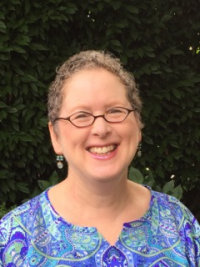

A year after I joined the ovarian cancer survivor club, I sometimes still blink in disbelief that it happened at all. It all started in late summer/early fall of 2017, when I began having some weird symptoms, including frequent heartburn and a feeling in my tummy that was simultaneously tender and hard. In the context of a busy personal and professional life, these changes came to my attention only sporadically, and when they did, my conclusion was that I probably needed to cut out the carbs, watch what I was eating, lose weight, etc.—no surprise from a woman in her late 50s.
By the end of October, though, I realized I should get checked out. I will never forget the response of the physician’s assistant who examined me in urgent care. You have a large growth in your abdomen. Normally, we would do an ultrasound but I’m recommending we go right for the CT scan. Uh-oh. A day after that, testing revealed a growth the size of a honeydew melon and the day after that, I was in the office of a gynecological oncologist scheduling a full hysterectomy. Based on the CT scan, the doctor felt it was likely that the growth was just a fibroid. I asked, if it’s not a fibroid, what is it—ovarian cancer? When he said yes, I blanched—because my (admittedly vague) concept of ovarian cancer was that it was a really bad cancer to get. I was somewhat reassured when he said that ovarian cancer is very treatable, particularly in the early stages. I was also pleased that my regular gynecologist had referred me to this specialist who could get to the bottom of what was going on.
Two weeks later, I underwent a five-hour surgery, which ended up including a bowel resection to take out the tumor and led to a diagnosis of Stage 2C ovarian cancer. My doctor’s sense that the debulking had been successful was borne out in my CA125 levels, which dropped to a high normal level after the surgery. I then started on the six rounds of chemotherapy that are familiar to so many ovarian cancer patients, accompanied by some complementary treatments by an acupuncturist and a naturopath. Everything went well and in May 2018, the post-chemo CT scan allowed my doctor to proclaim no evidence of disease. Although I’m still dealing with some of the side effects of my treatment, including hot flashes, neuropathy in my feet and achiness in my tendons, I’m working to regain my physical strength and stamina and hoping that these sensations will abate over time.
So, what is ovarian cancer about for me? For one thing, the experience of diagnosis and treatment underscored what a great life I have: a strong marriage, loving family and friends, adequate financial resources to address this crisis and a job I love. (A friend of mine humorously captured the paradox of feeling this way in the midst of a life-threatening illness by sending me a card that that said SO F***ING BLESSED. Indeed!) I was pleased to find that I didn’t spend time agonizing over the WHY question; I just accepted my life situation and as much as possible, focused on moving forward and getting through treatment. Complimenting me on my attitude, one of the members of my healing team said to me, Penny, if I ever get cancer, I want to be you, which was certainly nice to hear.
Nonetheless, having cancer involves a whole lot more than being an inspirational figure to others. At a core level, it is a journey we take alone, a walk “through the valley of the shadow of death” as the psalm says. Having cancer puts us deeply in touch with our physical and emotional vulnerability and the fundamental lack of control we have over our lives. Having ovarian cancer adds a deeper layer of vulnerability because it attacks parts of our body that are directly connected to our fertility, sexuality and identity as women. We’ve literally and figuratively been gutted by this disease. What’s more, we know the statistics: some of us will make it long-term, but some of us won’t.
And still, we rise — embracing our vulnerability at the same time we embrace our strength. Even as I struggle sometimes to manage (or just endure with equanimity) the residual effects of my treatment, I am so deeply grateful for the kindness and skill of those who provided it. I seek out ways to express and experience joy, creativity and connection, because I now understand in a deeper way than I did before that this is what I’m called to do—not in the future, but NOW. I strive to educate others about this disease and to provide support to my teal sisters.
And I live in hope. To me, hope doesn’t mean a blind emphasis on the most positive outcome that can possibly be imagined. Instead, it involves accepting the way things are yet still focusing on what has potential, on what is life-giving. I am hopeful not only for myself but also for the other women surviving this disease, and for those who will be diagnosed in the future. While on one level I would have not have chosen to join the ovarian cancer survivor club, on another level, I’m very proud to be a member, because we ovarian cancer survivors embody resiliency, strength and courage. If you’re also a member, congratulations–so do you!
